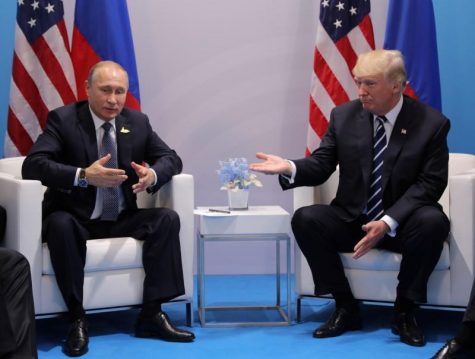Shaky support in Trump’s first year
February 21, 2018
Amidst the clouds of hazy speculation that has shrouded the most recent man to take the Oval Office, President Donald Trump emerges from his first year in office still standing. Notorious for his bold statements and arbitrary daily tweets, his lack of professionalism factors into the perspectives held by many Brahmas, supporters and dissenters alike.
As his stance on immigration continued to waver between pro-deportation and aiding the Dreamers—illegal immigrants brought during childhood—the president’s only decisive action in 2017 was the repeal of Obama’s Deferred Action for Childhood Arrivals policy, which set the deadline for the end of Dreamer protections at March 5.
“I think he is doing pretty good immigration-wise,” Diamond Bar High School junior Gisel Munoz said. “The whole thing about [not] letting them in, yeah it’s sad but [prioritizing] the rights of people who aren’t citizens over the people who are American citizens [isn’t right].”
In December, Trump fulfilled one of his major campaign promises after signing into law the Tax Cuts and Jobs Act, cutting corporate as well as individual taxes.
“Lowering taxes on corporations don’t really help in producing jobs for the middle class… it’ll be directed to investors and used for greater dividends on stock prices,” junior Hamzah Daud said. “I think he doesn’t really care about what legislation is passed. He just signs whatever he wants, whatever is put in front of him.”
While these tax reductions would be in permanent effect for businesses, they are set to expire in 2025 for everyday citizens.
“He’s changed his position on a few of his campaign promises, but I think he did good work with the tax reform,” senior Logan Knight said via Facebook. “His rhetoric, though not exactly presidential, brought discourse to important issues.”
In the first quarter of his term, we saw the president dominate the headlines with his bold statements, carrying over the trend from the unprecedentedly bold campaign strategy that garnered him so much attention in 2016.
“I was expecting his rhetoric to change when he entered office but it hasn’t really,” Knight said. “I think he would be a much more effective president if he worded his speeches and tweets better.”
From the table-tennis of undisguised threats launched between him and North Korean dictator Kim Jong Un throughout 2017 to his latest derogatory remark this January in reference to Haitian and African nations, Trump remains notorious for formulating his responses in a way no predecessor has been known to do.
“If you kind of remove the debate of conservative versus liberal or Republican versus Democrat, just does this person have a good temperament to do the job? In my feeling I decided early on that he did not because he’s just too divisive,” DBHS biology teacher Eric Sorensen said. “A lot of people switch modes when they go from campaigner to actually being the president, and for the most part he has not.”
Throughout the course of this past year, Trump’s administration passed a total of 117 pieces of legislation, the majority of which served as extensions of existing bills.
In regards to the remaining three years of his term to come, just how much of his own influence will reign over any new changes in the country is not necessarily clear.
“I think most of his actual policies are probably going to come from more mainstream Republicans, but that he will probably continue to hog the headlines with his behavior,” Sorensen said.










